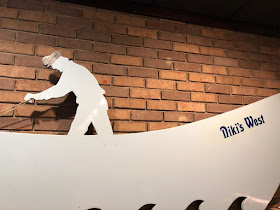Well, sort of. Let's investigate.
Thomas coached at Alabama until 1946 and had great success. According to Wikipedia, "During his tenure at Alabama, Thomas amassed a record of 115–24–7 and won four Southeastern Conference titles while his teams allowed an average of just 6.3 points per game.[2] Thomas's 1934 Alabama team completed a 10–0 season with a victory over Stanford in the Rose Bowl and was named national champion by a number of selectors."
After the last game of the 1931 regular season, Alabama played a charity game against Chattanooga at that team's Chamberlain Field. The purpose was to raise money for unemployment relief efforts during the Great Depression. Alabama won that game 39-0.
A week later on December 12 Alabama played another charity "game", but this one was a bit different. Here's what the Wikipedia entry says:
"After the first charity game against Chattanooga, an all-star team of former Alabama players was assembled to compete in the second charity game [in the District of Columbia] to benefit the unemployed.[30] The game was played at Griffith Stadium and featured three separate contests against George Washington, Catholic University and Georgetown.[30][31]Each of the three games consisted of two, ten-minute halves, and because the Alabama team was playing three separate squads, the Crimson Tide was allowed to make unlimited substitutions.[30]
"The players on the Alabama team were primarily from the current and 1930 team that captured the national championship, and were led by coach Thomas and assistant coach Hank Crisp.[30] The players selected included: Dave Boykin, Herschel Caldwell, John Campbell, Joe Causey, C. B. "Foots" Clement, Edgar Dobbs, Jess Eberdt, Albert Elmore, Ellis Hagler, Frank Howard, Allison Hubert, Max Jackson, Leon Long, Ralph McRight, John Miller, Claude Perry, Clyde "Shorty" Propst, Joe Sharpe, Fred Sington, Ben Smith, Earl Smith, John Henry Suther, John Tucker and Jennings B. Whitworth.[30]
"With all three played on December 12, Alabama faced George Washington in the first contest. Although the game ended in a 0–0 tie, Alabama had several long plays that included a pair of successive runs by John Campbell for 75 yards and a 55-yard passing play from Allison Hubert to Campbell.[31] The Crimson Tide then defeated Catholic University in the second game 7–0. The only score of the game was set up after Leon Long intercepted a Catholic pass at their own 42-yard line. After five runs for 31 yards by Hubert and one by Herschel Caldwell for three yards, Long scored the game-winning touchdown on a three-yard run.[31] In the final game, Alabama tied Georgetown 0–0 after Long intercepted a Hoyas pass in the end zone on a fourth-and-three play late in the second period.[31]"
So, depending on how you look at it, the Crimson Tide played three games that day, or one game against three different opponents. Some of the coverage in a Washington, D.C. newspaper the day before the game can be seen below. Follow the link to read more.
The headline writer seemed impressed by the "size of Alabama gridders."
Source: Wikipedia


























































